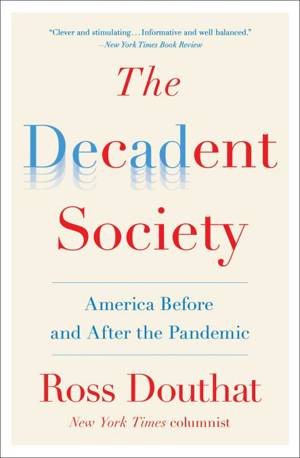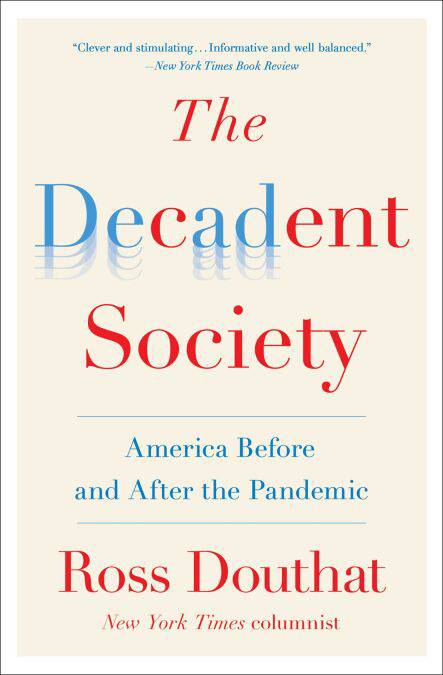
- Afhalen na 1 uur in een winkel met voorraad
- Gratis thuislevering in België vanaf € 30
- Ruim aanbod met 7 miljoen producten
- Afhalen na 1 uur in een winkel met voorraad
- Gratis thuislevering in België vanaf € 30
- Ruim aanbod met 7 miljoen producten
Zoeken
The Decadent Society E-BOOK
How We Became the Victims of Our Own Success
Ross Douthat
E-book | Engels
€ 14,53
+ 14 punten
Uitvoering
Omschrijving
From the New York Times columnist and bestselling author of Bad Religion, a powerful portrait of how our wealthy, successful society has passed into an age of gridlock, stalemate, public failure and private despair.
Today the Western world seems to be in crisis. But beneath our social media frenzy and reality television politics, the deeper reality is one of drift, repetition, and dead ends. The Decadent Society explains what happens when a rich and powerful society ceases advancing—how the combination of wealth and technological proficiency with economic stagnation, political stalemates, cultural exhaustion, and demographic decline creates a strange kind of “sustainable decadence,” a civilizational languor that could endure for longer than we think.
Ranging from our grounded space shuttles to our Silicon Valley villains, from our blandly recycled film and television—a new Star Wars saga, another Star Trek series, the fifth Terminator sequel—to the escapism we’re furiously chasing through drug use and virtual reality, Ross Douthat argues that many of today’s discontents and derangements reflect a sense of futility and disappointment—a feeling that the future was not what was promised, that the frontiers have all been closed, and that the paths forward lead only to the grave.
In this environment we fear catastrophe, but in a certain way we also pine for it—because the alternative is to accept that we are permanently decadent: aging, comfortable and stuck, cut off from the past and no longer confident in the future, spurning both memory and ambition while we wait for some saving innovation or revelations, growing old unhappily together in the glowing light of tiny screens.
Correcting both optimists who insist that we’re just growing richer and happier with every passing year and pessimists who expect collapse any moment, Douthat provides an enlightening diagnosis of the modern condition—how we got here, how long our age of frustration might last, and how, whether in renaissance or catastrophe, our decadence might ultimately end.
Today the Western world seems to be in crisis. But beneath our social media frenzy and reality television politics, the deeper reality is one of drift, repetition, and dead ends. The Decadent Society explains what happens when a rich and powerful society ceases advancing—how the combination of wealth and technological proficiency with economic stagnation, political stalemates, cultural exhaustion, and demographic decline creates a strange kind of “sustainable decadence,” a civilizational languor that could endure for longer than we think.
Ranging from our grounded space shuttles to our Silicon Valley villains, from our blandly recycled film and television—a new Star Wars saga, another Star Trek series, the fifth Terminator sequel—to the escapism we’re furiously chasing through drug use and virtual reality, Ross Douthat argues that many of today’s discontents and derangements reflect a sense of futility and disappointment—a feeling that the future was not what was promised, that the frontiers have all been closed, and that the paths forward lead only to the grave.
In this environment we fear catastrophe, but in a certain way we also pine for it—because the alternative is to accept that we are permanently decadent: aging, comfortable and stuck, cut off from the past and no longer confident in the future, spurning both memory and ambition while we wait for some saving innovation or revelations, growing old unhappily together in the glowing light of tiny screens.
Correcting both optimists who insist that we’re just growing richer and happier with every passing year and pessimists who expect collapse any moment, Douthat provides an enlightening diagnosis of the modern condition—how we got here, how long our age of frustration might last, and how, whether in renaissance or catastrophe, our decadence might ultimately end.
Specificaties
Betrokkenen
- Auteur(s):
- Uitgeverij:
Inhoud
- Aantal bladzijden:
- 272
- Taal:
- Engels
Eigenschappen
- Productcode (EAN):
- 9781476785264
- Verschijningsdatum:
- 24/02/2020
- Uitvoering:
- E-book
- Beveiligd met:
- Adobe DRM
- Formaat:
- ePub

Alleen bij Standaard Boekhandel
+ 14 punten op je klantenkaart van Standaard Boekhandel
Beoordelingen
We publiceren alleen reviews die voldoen aan de voorwaarden voor reviews. Bekijk onze voorwaarden voor reviews.











